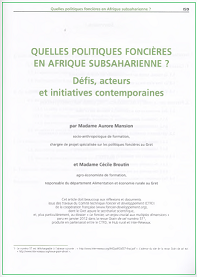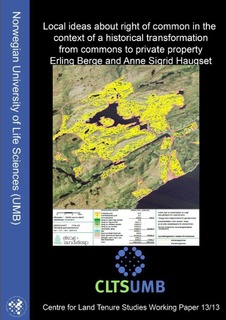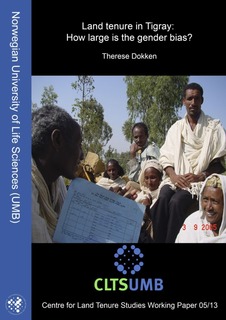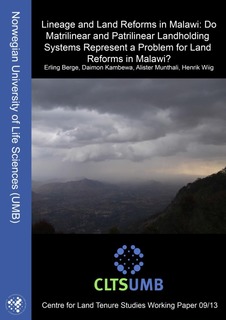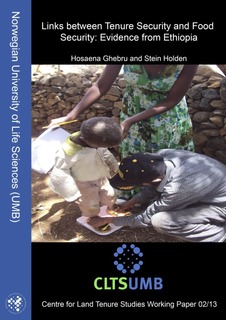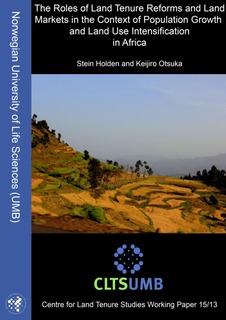Quelles politiques foncières en Afrique subsaharienne ? Défis, acteurs et initiatives contemporaines
Local ideas about rights of common in the context of a historical transformation from commons to private property
Paper presented at the 14th global conference of the International Association for the Study of Commons, Mt Fuji, June 3- June 7, 2013
Land tenure in Tigray : how large is the gender bias?
This study finds that female-headed households have 23% smaller owned landholdings and 54% smaller operational landholdings. Differences in characteristics such as age, labor, oxen and previous divorce explain less than half the differences in landholding sizes, while the remaining can be attributed to differences in returns to these characteristics. This indicates that there is a gender bias in access to land, even after land reforms that intended to strengthen women’s rights.
Lineage and land reforms in Malawi: do matrilinear and patrilinear landholding systems represent a problem for land reforms in Malawi?
This paper is about land tenure relations among the matrilineal and patrilineal cultures in Malawi. Data from the National Agricultural and Livestock Census are used to characterize marriage systems and settlement and landholding patterns for local communities. Marriage systems correspond to customary land tenure patterns of matrilineal or patrilineal land holding. The differences between the two major ways of land holding represent a particular challenge for land reforms intending to unify rules for land tenure and land devolution.
Links between tenure security and food security : evidence from Ethiopia
The study uses five rounds of household panel data from Tigray, Ethiopia, collected in the period 1998–2010 to assess the impacts of a land registration and certification program that aimed to strengthen tenure security and how it has contributed to increased food availability and thus food security in this food-deficit region. Our first survey took place just a year before the intervention (the land certification program).
The roles of land tenure reforms and land markets in the context of population growth and land use intensification in Africa
This article provides a review of the past and potential future roles of land tenure reforms and land markets in Sub-Saharan Africa (SSA) as responses to population growth in the process of land use intensification and livelihood transformation. The farm size distribution and the existence of an inverse relationship (IR) between farm size and land productivity in SSA and the implications of this relationship for efficiency and equity are investigated.
Determinants of inorganic fertiliser use in the mixed crop-livestock farming systems of the Central highlands of Ethiopia
Use of inorganic fertilizers could be fundamental in addressing low and declining soil fertility while improving food security in sub-Sahara Africa. Determination of key factors responsible for use of inorganic fertilizers in the central highlands of Ethiopia is increasingly important as continued land redistribution in already degraded and land-scarce highlands undermines sustainable farming and increases nutrient mining.
Land reform
This chapter uses both classic and contemporary literature to trace how land policies, and particularly land reform, have gained, lost, and regained prominence in development strategies and debates since the Second World War. It introduces contemporary issues and debates on gender and generational issues in land policy and land grabbing involving sometimes spectacularly large corporate land deals, and concluding with reflections on new ideas of food and land sovereignty that drive today’s agrarian movements.
New black gold : how can carbon markets work for forest communities?
Reduced Emissions from Deforestation and Degradation (REDD) could enable some of the poorest forest communities to be paid to conserve and protect their forest resources by companies seeking to offset carbon emissions. This project examines the REDD mechanism from a pro-poor perspective, particularly from the standpoint of local communities, and assesses knowledge gaps among community residents and leaders about carbon trading to avoid deforestation – do they understand and appreciate the rules as they have been developed through a distant global discourse?
Governing land for women and men: A technical guide to support the achievement of responsible gender-equitable governance land tenure.
Based on the principles of sustainable development and in recognition of land’s centrality to development, these Guidelines are intended to contribute to global and national efforts towards the eradication of hunger and poverty by promoting secure tenure rights and equitable access to land, fisheries and forests.
This technical guide on Governing land for women and men aims to assist implementation of the Guidelines’ principle of gender equality through the achievement of responsible gender-equitable governance of land tenure.
Gender Inequalities in Ownership and Control of Land in Africa: Myths versus reality
Over the past decade, stakeholders have made a variety of generalized claims concerning women’s landownership, both globally and in Africa.


